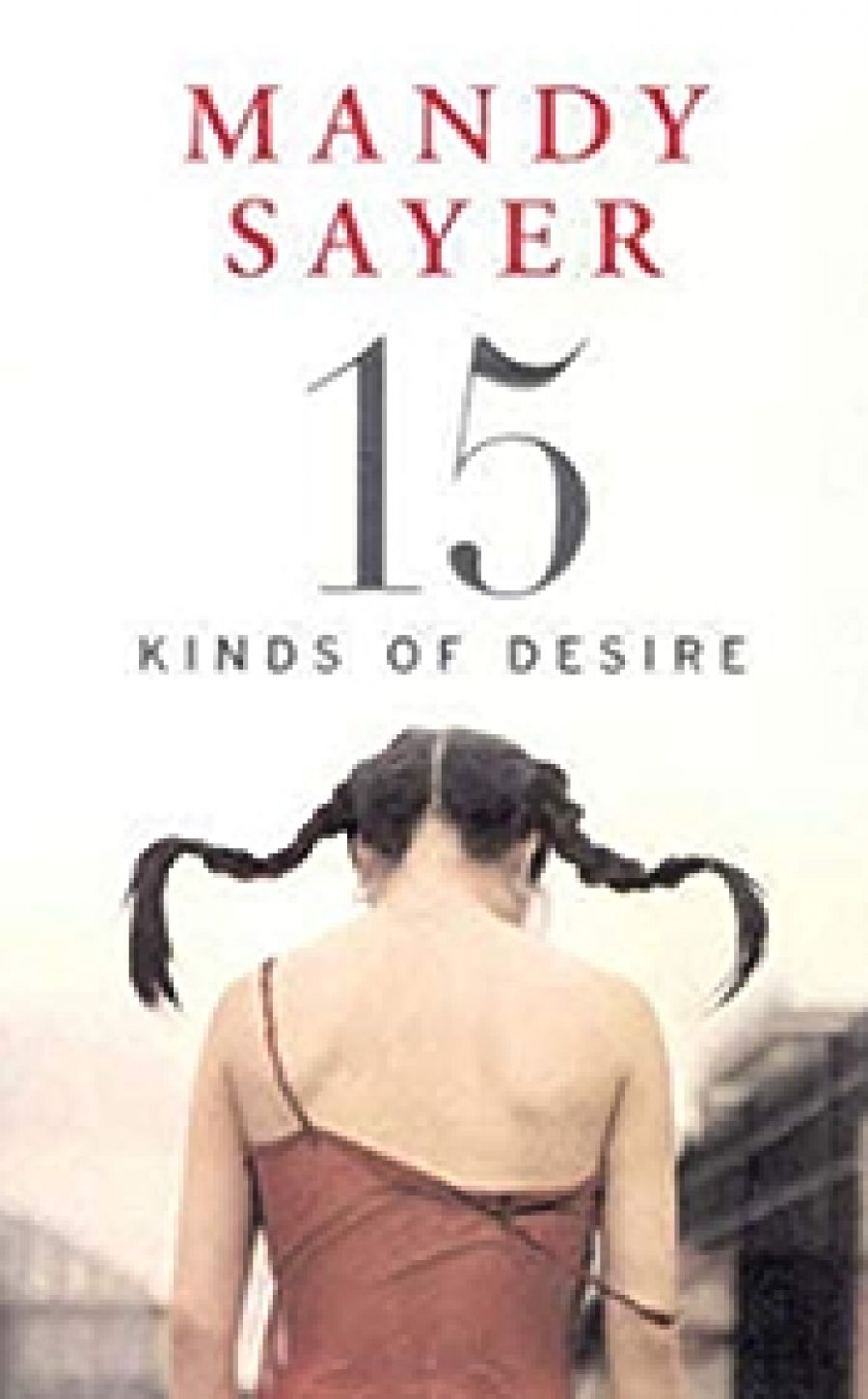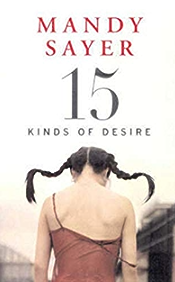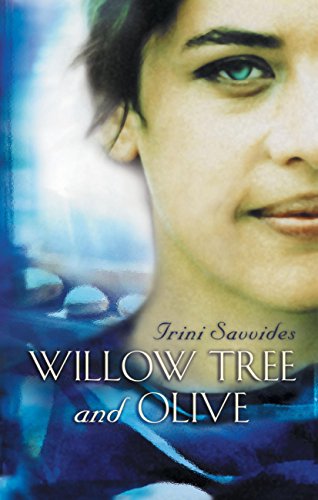
- Free Article: No
- Contents Category: Fiction
- Review Article: Yes
- Article Title: Shards of Hope
- Online Only: No
- Custom Highlight Text:
Husbands, wives, and lovers, desperadoes, mistresses, adulterers, transsexuals, prostitutes and paedophiles: these are some of the people who populate Mandy Sayer’s 15 Kinds of Desire. Despite such a roll-call of confronting players, Sayer’s short story collection is not so much an itemisation of sexual peccadilloes but an exploration into various gradations of love, sex and obsession.
- Book 1 Title: 15 Kinda of Desire
- Book 1 Biblio: Vintage, $19.95 pb, 222 pp
- Book 1 Cover Small (400 x 600):

- Book 1 Cover (800 x 1200):

- Book 2 Title: Willow Tree and Olive
- Book 2 Biblio: Sceptre, $16.95pb, 260 pp
- Book 2 Cover Small (400 x 600):

- Book 2 Cover (800 x 1200):

Sayer has waxed lyrical about the mythology of Kings Cross many a time, most famously in her memoir A Dreamtime Alice. Yet just when you think she’s stuck in this territorial groove, she changes her tune and sets other tales in New Orleans, in Las Vegas, in urban and rural France, and in the Australian outback. As in any short story collection, some efforts are stronger than others, but together these fifteen kinds of desire are a beguiling brew. Sayer reintroduces characters into different narratives so that these seemingly disparate stories turn out to be interconnected in ways tenuous or deadly. This structural device offers not only multiple perspectives of the same incident, but also a delicious criss-crossing chain of cause and effect.
Inspired by the style of Richard Ford, Sayer’s prose is lyrical and clean, stripped of any flowery euphemism or Mills & Boon coyness. The effect has the immediacy and power of a punch in the face. Witness the ritual of Scarlet as she prepares to inject her prone mother: ‘She’d watched her mother long enough to know how much to mix in the spoon, where to tie the tourniquet, how to sink back the plunger to between .02 and 0.3 ml. She didn’t mind doing it, as it always made her mother much better.’
Although several of these tales dive into the escapades of the sad and the desperate, the collection as a whole is not titillating. We are voyeurs, but Sayer’s empathy for her characters prevents them being seen as freaks or gutter-crawlers. Her co-edited anthology about Kings Cross is called In the Gutter … Looking at the Stars, which Wildean title is as applicable to the present collection. Though the circumstances may be grim and the desire self-destructive, there is some-times a shard of hope. Within these scarlet pages, a sexually potent orchid is offered as a conciliatory gesture; a prostitute comforts her rival after deciding not to kill him; and a cautiously happy relationship is borne after a spate of serial marriages. There are twist endings, comeuppance retorts and unpredictable detours, but Sayer’s sturdy hand is always there to guide us through the various permutations of desire. desire to escape from the past overwhelms all others in Willow Tree and Olive. Savvide’s book is a Greek tragedy of sorts, albeit one shrink-wrapped in the form of young adult fiction. In this mini-odyssey of nemesis and catharsis, the quest for self-affirmation is as formidable as any Homeric obstacle.
However, the first act is all blue skies and golden orb as we swoop down on seventeen-year-old Olive whooping it up at a Greek christening party. She is the godmother of her cousin’s second child, and there is much singing, dancing and plate-smashing as the baby is dipped into a huge bird-bath. It is, as Olive points out, ‘a great night to be a wog’. Even the snooty waiter who reprimands the guests for breaking Wedgwood plates can’t dilute the effervescent mood.
But, gradually, nightmare sweats begin to taint the fabric of everyday banality. Olive, the blabbermouth, curls into a binge-eating introvert who cuts her hair stubble-short and refuses to speak to anyone except a giant teddy bear. Repressed memories have a nasty habit of resurfacing. For Olive, it’s the memory of being raped as a five-year-old. The truth comes out in sobbing spurts but, although Olive has the support of family and friends, it’s only when she returns to Greece that her demons are exorcised. She visits the trees she was named after, climbs the steps of Delphi and takes strength from the voices of her ancestors.
For a while, though, it seems as though transcultural dislocation was the source of Olive’s grief: ‘For so many years I thought feeling different was from being a wog, having the wrong-coloured hair and skin, and eating food that smelt.’ Melina Marchetta (of Looking for Alibrandi fame) has endorsed this novel, which is not that surprising considering its similarity to her own. Like Marchetta’s plucky young heroine, Olive oscillates between pride in her heritage and resentment when others define her by it. Savvides’s treatment of racial stereotype is underscored by a cheeky humour; being Greek-Australian herself she can relate to barbs about fish and chip shops. But the humour is soon overwhelmed by darker reflections when Olive is forced to confront her past. Curiously, Savvides sidesteps any examination of the rape itself; the events leading up to it and the offender himself are barely discussed. Such a dearth of information is frustrating, provoking too many unanswered questions.
Willow Tree and Olive is fairly standard young adult fiction: accessible and competently handled, but not terribly challenging. Savvides interrupts the prose with bits of poetry as Olive tries to write herself right again. Thankfully the narrative deviates from the usual trinity of headaches that beset teenagers: school, parents and boys. Ultimately, it’s more concerned with the healing of a damaged person, the desire for regeneration.


Comments powered by CComment